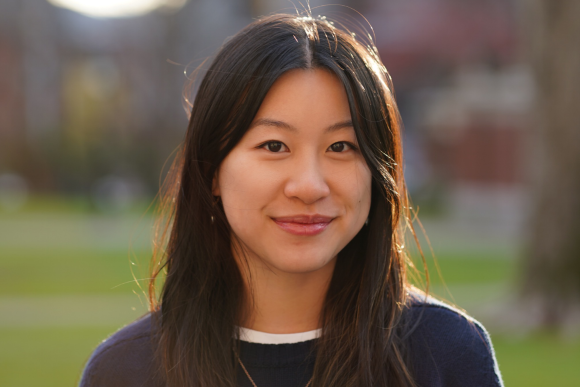Until eighth grade, Clara Tandar wanted to study English. Then she discovered something—that science is creative.
“We may not think of science as the most creative field, but for me, it was a space where I could explore a topic outside of the classroom that I was really interested in and passionate about,” Tandar says.
Now a junior at Brown University, Tandar wants to ultimately become a physician scientist, interested in creating therapeutic systems for treating cancer. Reflecting back, she can see how her middle and high school years greatly shaped her path to where she is now.
Growing up in Salt Lake City, Utah, Tandar often found she had to pursue work outside of the classroom due to underresourcing at her school, especially in science. That led her to science fairs starting in middle school, where her first project looked at the effects of vitamin C on melanoma. Tandar had many questions on the topic at a dermatology appointment, and the doctor suggested she reach out to a colleague of his at the Huntsman Cancer Institute.
“So, I emailed her [his colleague] just out of curiosity, saying, I want to learn more about this,” Tandar recalls. “She showed me around the lab and asked, ‘Do you want to explore melanoma more and be involved in some way?’ Now looking back, not only did I appreciate being able to delve into the scientific process in a hands-on way, but I also valued the mentorship she gave me and how I've taken that experience to continue to explore questions that I'm interested in.”
Having that time in a real lab was formative for Tandar in many ways—not the least of which was being able to continue working with a mentor she met through the Huntsman Cancer Institute, Dr. Trudy Oliver, with whom she would continue to pursue summer research at Duke University as an Amgen Scholar in 2023. Tandar would first meet Oliver as an extension of her eighth-grade science fair project, continuing to work in Oliver’s lab throughout high school. She would take buses there on her own, not wanting to bother her parents with transportation. Tandar also participated in science fairs annually in high school, exploring various projects at the nationally competitive level, as well as through a computational biology summer program in Italy.
Through this work—studying lung cancer cell lines and therapeutics in the lab—she became interested in learning more about cancer resistance to chemotherapy. After entering Brown as a bioengineering and public policy major, she looked for various summer research experiences, continuing to seek out hands-on learning beyond the classroom wherever she could. The summer after joining Dr. Eric Darling’s lab (in the fall of her freshman year), she worked as a bioengineering intern at Draper Laboratory in Cambridge, MA. She collaborated with both research groups to engineer microparticles for biological applications, publishing a paper and presenting this work at a conference in Nashville. Again, she found incredible mentorship with Darling, as well as Ryan Dubay and Jason Fiering.
The next summer, Tandar participated in the Amgen Scholars research program at Duke University, working again with Oliver. “Dr. Oliver was truly phenomenal for letting me join in and contribute, nurturing my interest in science,” Tandar says. “When I was in her lab this summer, she would have long weekly meetings with me where she would not only guide me through how to improve my oral presentation and communication skills, but also how to phrase my findings, bringing the most important and relevant parts of your work to the forefront. Especially in bioengineering, with people coming from so many different fields, it’s important to communicate your science to a broad audience to be able to facilitate collaboration and create a greater impact.” Tandar has taken these communication skills and already applied them to various contexts, including work to improve health disparities in rural areas.
Tandar’s diverse experience with research to date has also shown her how to scale up her own experiments to explore her ever-growing scientific interests. “In high school, I learned to make sure that my science was robust by testing a question from different points of view,” she says. “As I've gotten older, and with the Amgen Scholars Program and my other research experiences, I've been able to make those experiments more complex with guidance and mentorship. Now, I don't have to fit it into this one box that I was taught in high school.”
